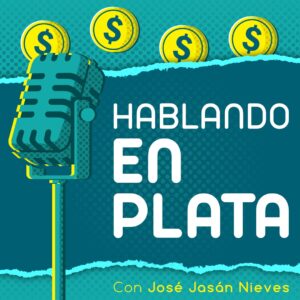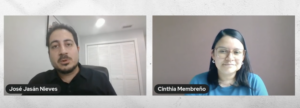For Cuban journalist José Nieves, founder of El Toque, finding a way to make his digital media outlet sustainable keeps him up at night. Not only must he face the challenges familiar to any journalistic endeavor, but he must do so from exile.
The exile of journalists has become a threat to press freedom in the world. Latin America has not been immune to this: in recent years at least 300 journalists have fled Nicaragua, Ecuador and Guatemala, according to records from press freedom organizations. In exile, journalists face threats, lack of protection and of course economic precariousness. Continuing with their work becomes one of their biggest concerns and the help they receive is usually not enough.

Cuban journalist José Nieves. (Photo: Courtesy)
Nieves knows that it is not easy to achieve, and that is why his two recent fellowships in the United States – one of which ends next April – have focused on creating products that offer information on sustainability strategies for Latin American media working from exile.
As part of his final project as a fellow in the Executive Program in News Innovation and Leadership at the Craig Newmark Graduate School of Journalism in New York, he created “Hablando en Plata” (Speaking in Dollars). It is a five-episode video podcast in which Nieves and his colleagues from Cuba, El Salvador, Nicaragua and Venezuela discuss what has worked and what has not in terms of sustainability.
“The lessons from these sustainability strategies that we have implemented in Latin American exile media not only go beyond the Latin American region, but apply to any media outlet,” Nieves, who is currently a Knight Fellow of the International Center of Journalists (ICFJ), told LatAm Journalism Review (LJR),
His colleagues discuss strategies for finding sustainability, including membership campaigns, content agencies, virtual stores, events, as well as challenges they face, ranging from succession plans, advertising crises, barriers from platforms, among others.
For the first episode, Nieves sat down with El Toque’s business director, Beatriz Valdés, to speak about the experience of their own media outlet.
“It seemed to me that the honest thing to do was to start being transparent, being explicit about how we at El Toque do it,” Nieves said in an interview with LJR.
Among several topics, Valdés and Nieves explained what they think can help achieve sustainability: “diversification, diversification and diversification.”
“There is no recipe for sustainability. There is no single model and that is what I have learned the most in recent years. The model is the sum of alternatives,” Nieves said.
When a single measure is used to obtain resources, the media outlet is left vulnerable. This includes relying entirely on grants from large donors – whether they’re technology platforms or philanthropic organizations, advertising or membership models.
“You can have 10 organizations that give you grants and [think] that is enough. But in any case, your sustainability model is based only on grants and there you have a weakness,” Nieves said.

The war in Ukraine was a great lesson for media in the region, Nieves said. At that time, European countries and organizations poured their resources towards the country at war, abandoning projects in Latin America.
Indeed, the lack of diversification or dependence on money from funders has been identified in recent studies as a problem for digital native media. SembraMedia found that during 2023 a large number of digital native media in Latin America closed, among other reasons, due to the drop in funding. Added to this is a study that found how journalistic organizations can become dependent on programs from tech platforms – like Google News Initiative.
Although Nieves said that the video podcast is not an academic study, he has managed to identify between nine and 10 business models used by Latin American media in exile.
Based on them, he hopes to create an interactive guide for media and their leaders.
“I have found, in principle, a total willingness to be open, to talk about the ways in which they have done it and also recognize the challenges and barriers and recognize what has not gone well,” Nieves said. “The conversation has value because it is not a public relations exercise, but rather an honest reflection on the models and challenges that sustain our media.”
Cinthina Membreño, Nicaraguan journalist and coordinator of the Network of Exiled Media Outlets (NEMO), was one of the participants in the video podcast. Membreño was a journalist for the magazine Confidencial, whose headquarters were raided by President Daniel Ortega's administration in December 2018 and never returned to its owners. She worked from exile for the magazine and two years ago, together with colleagues from other countries, promoted the creation of NEMO.
For her, the 'Hablando en Plata' conversations have great value for those journalists forced into exile and who seek to continue with their profession.
“The information that the sector of media in exile is sharing is key to the survival of independent journalism in general, but specifically of media that cannot operate in their countries of origin,” she told LJR.
El Toque and NEMO have collaborated with each other through workshops led by Nieves for media in exile with the purpose of creating “more resilient media in contexts that are truly hostile to independent journalism.”
In addition to this guide, Nieves wants to advance his podcast and that is why he is planning at least 10 more episodes to delve into other spheres of sustainability.

José Nieves talking with journalist Cinthia Membreño for the video podcast. (Screenshot)
As he explained, Nieves follows the concept promoted by Lion Publishers in which the financial health component (getting money) is only part of sustainability. For the organization, it is an intersection between financial health, journalistic impact and operational or organizational resilience.
“I feel that what we have to talk about even more, in addition to money, is operational resilience and the care and policies that the media in exile need to have so that our teams survive and continue to grow,” Nieves said.
For Nieves, aspects such as how holidays, vacations, leave, health insurance, succession plans, among others, are handled, must also be discussed as part of sustainability because otherwise the team may end up exhausted.
“This has been a collateral finding from the conversations, but it is important,” he said.
It’s one of the topics that the work of NEMO and Membreño also focus on. The journalist explained in the podcast the importance of obtaining more resources to guarantee the mental health of journalists in exile.
“We must not lose sight of the fact that the survival and sustainability of the media is also linked to the psychological care of the human beings who make up a team,” Membreño said in the interview with LJR.
The first five episodes are available on YouTube (both video and audio), Spotify, Amazon Music and Audible.